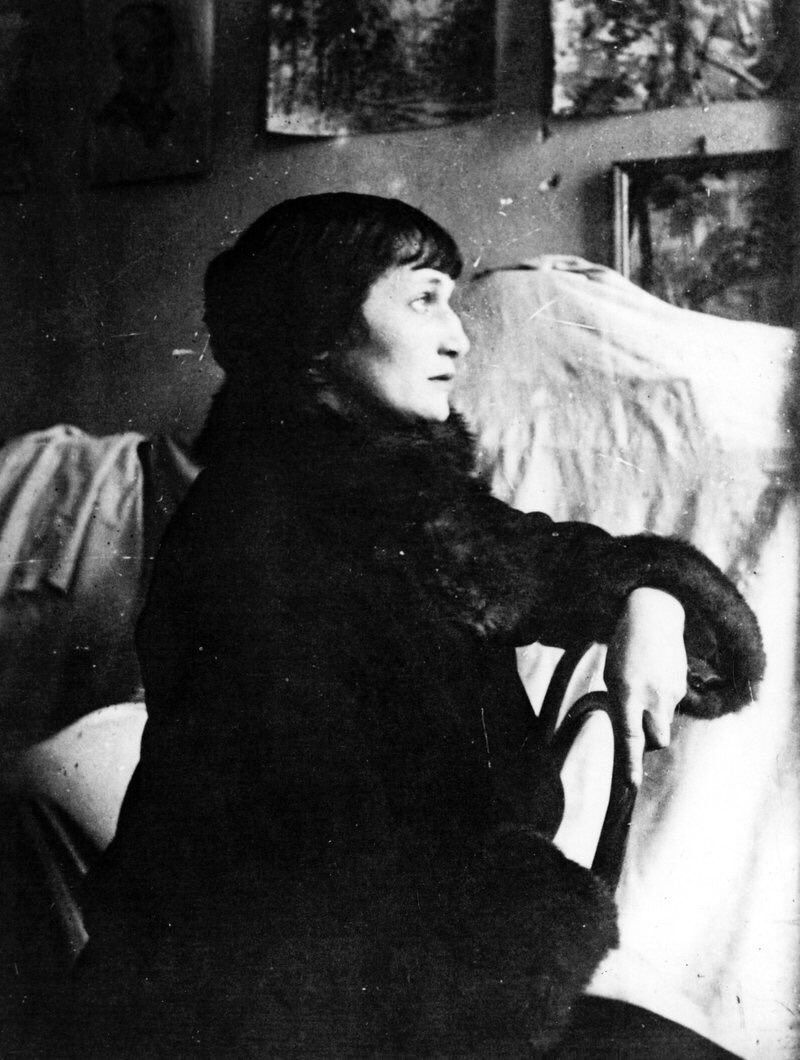Был он ревнивым, тревожным и нежным (He was jealous, anxious, and tender) by Anna Akhmatova
- Myron Kharkover

- May 28, 2020
- 4 min read
Updated: Aug 23, 2020

"He was jealous, anxious, and tender" (Был он ревнивым, тревожным и нежным) was written by Anna Akhmatova in 1914. Below is the original Russian text, and under it is an English translation.
Был он ревнивым, тревожным и нежным,
Как Божие солнце, меня любил,
А чтобы она не запела о прежнем,
Он белую птицу мою убил.
Промолвил, войдя на закате в светлицу:
"Люби меня, смейся, пиши стихи!"
И я закопала веселую птицу
За круглым колодцем у старой ольхи.
Ему обещала, что плакать не буду,
Но каменным сделалось сердце мое,
И кажется мне, что всегда и повсюду
Услышу я сладостный голос ее.
He was jealous, anxious, and tender,
And I was like God’s sun to him.
To stop her from singing of the days she remembered,
He killed my white bird on a whim.
He entered the front room at dusk and implored:
“Love me, laugh, and continue to write!”
And I buried the cheerful, jovial bird
Near the well by the alder that night.
I promised to him not to wallow in woe,
But my heart turned to stone, cold and bare,
And it seems to me, always, wherever I go,
I will hear her sweet voice in the air.
"He was jealous, anxious, and tender" (Был он ревнивым, тревожным и нежным) was written by Anna Akhmatova in 1914 when she was 25 years old. This poem is included in part I of her third book, "White Flock" (белое Cтая), which was released in 1917. She had already solidified her self as a prominent writer and poet following the release of her two previous books; she released her first book, "Evening" (Вечер), in 1912, and she released her second book, "Rosary" (четки), in 1914. Even though this poem was written in 1914, Akhmatova chose to include it in "White Flock" instead of "Rosary". This poem is about her relationship with her husband, Nikolay Gumilyov. At the time, she was having an affair with a man named Boris Anrep, a famous Russian mosaicist. She was also rumored to have had an affair with Alexander Blok, another prominent poet at that time. Her affairs just serve as evidence for her unhappiness in her marriage with Gumilyov. Another interesting aspect of this poem is that this was written and published before she even divorced her husband. "White Flock" was released in 1917, and she divorced Nikolay Gumilyov in 1918.
In the poem, Akhmatova describes life with her husband, and how unhappy she was. Whenever she mentions "He" in the poem, she is referring to Gumilyov. The woman she refers to in the poem by the pronouns "she" and "her" is herself, Anna Akhmatova. In the first stanza, Akhmatova explains that Gumilyov is "jealous, anxious, and tender", and by comparing herself to "God's sun" she shows how important she was to him. She then mentions that Gumilyov had killed her white bird to stop her from "singing of the days she remembered." In literature, a white bird is symbolic of love and peace. In this poem, Akhmatova uses the bird as a symbol of love, peace, and the happy times she had with Gumilyov. By killing the white bird, Gumilyov effectively killed her love for him and killed her ability to remember the good times they had. This is potentially why she had an affair in the first place. In the next stanza, she explains that Gumilyovtells her to "Love me, laugh, and continue to write!" She then immediately mentions that she buried the "cheerful, jovial bird ... by the alder that night." It is also important to note that she mentioned an alder. An Alder is a tree that belongs to the birch family. In a medieval Welsh poem, Cad Goddeu, the alder was used as a symbol for reincarnation. Akhmatova may have mentioned the tree to insinuate that when she buried her bird, or her happiness, near the alder, her bird will be reincarnated, or she will be happy again in the future. In the final stanza, Akhmatova promises her husband that she will not "wallow in woe" because her bird is dead. She promised her husband that she is not sad and that she is still happy with their relationship. Then, she explains that her "heart turned to stone, cold and bare," meaning that she really did not love him anymore, and was ready to leave him. Lastly, she concludes the poem with the line, "wherever I go, I will hear her sweet voice in the air." This means that even after she leaves her husband, no matter where she goes she will still have faint memories of the good times they shared.
This poem was written in 1914, but it is still relevant to the modern world. While some aspects of love may have changed, primarily the fact that people are now able to meet each other through online dating apps, in over 100 years, the nature of love has not changed. People in relationships still have to evaluate if they are truly happy. Akhmatova evaluates her happiness and love for her partner and ultimately decides they need to get a divorce. Many couples go through the same process before getting a divorce. In America, "almost 50% of marriages end in divorce or separation," and as of 2018 there are "2,419,196 divorces per year." These statistics display how frequently people have to go through the same process that Akhmatova describes in her poem.
References:



thank you, it was really helpful. but i think maybe in the last line, she meant her bird, not herself. so the translate might be wrong there.